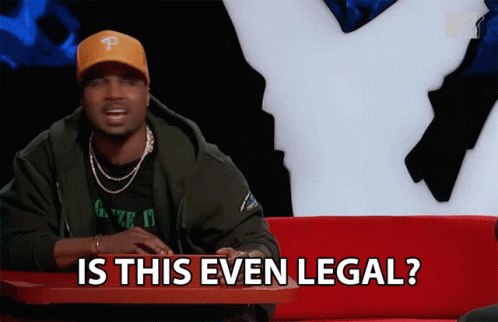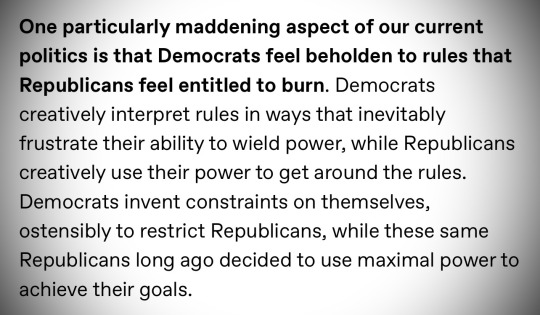#Pragmatism
Explore tagged Tumblr posts
Text
Victor stared helplessly at the city of lights. "Why us?" he said. "Why is it happening to us?" "Everything has to happen to someone," said Ginger.
Terry Pratchett, Moving Pictures
#victor tugelbend#ginger withel#moving pictures#discworld#terry pratchett#fate#resigned#causality#helpless#why#chance#pragmatism#why me#everything has to happen to someone
155 notes
·
View notes
Quote
When young, one is confident to be able to build palaces for mankind, but when the time comes one has one's hands full just to be able to remove their trash.
Johann Wolfgang von Goethe, "Letter to Johann Kaspar Lavatar (6 March 1780)"
#philosophy#quotes#Johann Wolfgang von Goethe#Letter to Johann Kaspar Lavatar#ideals#optimism#pragmatism#progress#humanity
228 notes
·
View notes
Text


Truly impressive what Minnesota accomplished with only a one seat majority

“…in addition to having a one-vote margin, this was not a radical left-wing legislature! There are plenty of moderate Dems here.
But the moderates, unlike (centrist) Dems elsewhere, still wanted to get stuff done and saw progressives as partners in making that happen.”
Rather than looking at the November numbers result and imposing some kind of self-limiting narrative about the scope of their mandate, MN Dems looked at their priorities and said "How much of the list can we get done?"
Turns out the answer was, "Almost everything."


Republicans did not worry about appeasing the sensibilities of Democratic voters when they rammed through Trump’s unqualified Supreme Court Justices, and then gutted Roe v. Wade.

THE MORAL OF THE STORY IS, whenever Dems have political power, instead of performatively agonizing about “reaching across the aisle” to compromise with Fascistic Republicans, or pontificating over & worrying about what Republican voters might think, they need to focus on one thing and one thing only: accomplishing ALL the good they can while they still can. Like Minnesota just did.
Dems need to be bold, and press through their base’s policies whenever they have the opportunity, not finger wag and tell us why the things we want are impossible and won’t ever happen.
“Pragmatically” “triangulating” and waiting for the “right” time, or waiting for a “better” time to do what is right only helps Republicans buy more time to entrench.
Time is a luxury that most poor and marginalized people simply cannot afford. Democratic politicians need to understand what MLKjr meant when he spoke of being wonderfully maladjusted, and the fierce urgency of now! and why he scornfully viewed moderate (centrist) whites as an even greater threat to progress than the KKK.
Minnesota is a solidly midwestern state. Hopefully if nothing else, Minnesota’s impressive list of recent accomplishments will belie the common DNC political “wisdom” that only conservatism-lite will work in middle America.
279 notes
·
View notes
Text
"The lesser of two evils is still evil."
That's just stating the obvious and acting like it's genius. It's like saying "A lighter shade of blue is still blue."
Also if I had to pick between a guy who will kick me in the crotch or a guy who will tear me limb my limb i'm going with the former.
#lesser of two evils#thank you captain obvious#captain obvious#stating the obvious#shades of blue#blue color#light blue#the former#obviously#also#not impressed#morality#pragmatism#harsh reality#tough decisions#evil#philosophical#philosphy#critical thinking#i thought it was obvious#nuance#no easy way out#gray area#dilema#decisions decisions#hard decisions#truisms#tautology#oversimplified
22 notes
·
View notes
Text
Theories of the Philosophy of Expression
The philosophy of expression explores the nature, significance, and implications of human expression in various forms, including language, art, music, and body language. It delves into questions about the origins of expression, its relationship to identity, culture, and society, and its role in human communication and understanding. Additionally, it examines ethical and aesthetic considerations surrounding expression, as well as the philosophical frameworks that underpin different modes of expression.
The philosophy of expression encompasses various theories and perspectives that seek to understand the nature and significance of human expression. Some prominent theories include:
Mimetic Theory: This theory, proposed by Plato and Aristotle, suggests that art and expression imitate or reflect reality. It emphasizes the role of art in representing the natural world and conveying universal truths.
Expressivism: Expressivism posits that expression, particularly in language and art, serves as a means for individuals to express their inner thoughts, emotions, and experiences. It emphasizes the subjective and personal aspect of expression, focusing on the individual's unique perspective.
Semiotics: Semiotics, developed by Ferdinand de Saussure and Charles Peirce, explores the study of signs and symbols and their interpretation. It examines how meaning is conveyed through linguistic and non-linguistic signs, highlighting the role of context and cultural conventions in interpretation.
Pragmatism: Pragmatist philosophers like John Dewey emphasize the practical consequences of expression. They argue that expression serves a functional purpose in communication and problem-solving, shaping social interactions and facilitating collective action.
Hermeneutics: Hermeneutics focuses on the interpretation of texts and cultural artifacts, including literary works, religious texts, and artistic expressions. It examines the process of understanding and meaning-making, considering the role of context, tradition, and the interpreter's perspective.
Aesthetic Theory: Aesthetic theories, developed by philosophers like Immanuel Kant and Arthur Schopenhauer, explore the nature of beauty and artistic experience. They examine how aesthetic judgments are formed, the criteria for evaluating art, and the relationship between art and morality.
Phenomenology: Phenomenological approaches, as developed by Edmund Husserl and Maurice Merleau-Ponty, explore the lived experience of expression. They focus on the first-person perspective and the embodied nature of expression, examining how individuals perceive, interpret, and engage with the world through expression.
These theories offer diverse insights into the complexities of human expression, highlighting its multifaceted nature and its significance in shaping individual and collective experiences.
#philosophy#epistemology#knowledge#learning#chatgpt#education#ontology#metaphysics#psychology#Philosophy of language#Philosophy of art#Philosophy of music#Body language#Communication#Identity#Culture#Aesthetics#Ethics#Human experience#Mimetic theory#Expressivism#Semiotics#Pragmatism#Hermeneutics#Aesthetic theory#Phenomenology#Interpretation#Meaning-making
19 notes
·
View notes
Text
Just to get something clear, I am an anarchist and I stand by my beliefs, but I am also a pragmatists. I might not like the system and want it gone, but you work with what got and not what you don't have. I will talk with you theory and ethics all you want, but when it comes to it, your philosophy is less important to me then actually doing the activism.
Be pragmatic in your activism, dream all you want, but nothing is gonna happen if you don't work with what you got.
25 notes
·
View notes
Text
youtube
Pragmatism & Truth - Rorty, Putnam, & Conant (2002)
7 notes
·
View notes
Text
Thesis
Ok basically the reason western medicine is comparatively more performant is to do with the fact that at its core it makes a more robust set of ethical considerations than its ancillaries. Comparatively it has been an assumption of some commentators that western rationality and the development of a superior, "bodies science" lies at the heart of a more efficacious medical practice and while the development of critical practices does run in deep parallel to the furtherance of medicine as a moral consideration it is overall secondary in its practical importance compared to the standardization of ethics surrounding physicianery. Extending this pattern of development to other technical domains we see in the domains of engineering, oratory, encyclopedism, pedagogy a similar set of developments where-in moral considerations further a technical practice through standardization and greater humanization. It is the suggestion of the author that similar considerations be made in the emergent technical (τέχνη) sciences like eg. development of human-computer interaction models, video games, emergent digital media forms and so on (...)
It is the suggestion of the author that the neopragmatic/Pragmatic turn presents a viable means forward in terms of the consequences of Aesthetics in technical disciplines-- Kuhn, Rorty, Lakatos, others cast shade on the models of the development of technical disciplines where-in historically totalizing models or, "narratives about" development are employed both in the practical and conceptual sense. Following from a pedagogical line which extends from John Dewey through Noam Chomsky the author's suggestion that while, "world-shaking developments" might lay upstream eg. neural networks, neural interfaces, improved theories about physics and neurology and so on that due to the consequences of 20th century North American pragmatic turn it seems unlikely that a humanities agnostic model of development will be a viable means of satisfactorily meeting the subjective needs of human beings in the 21st. It is the opinion of the author that harrowing developments in pedagogy, andragogy, and popular literacy are crucial.
2 notes
·
View notes
Text
See things for what they are. Not for what you want them to be.
#perspective#mindfulness#objectivity#reality#honesty#truth#introspection#reflection#pragmatism#discernment
16 notes
·
View notes
Text
There is something that we need to be clear about in regards to elections, wherever they may be held.
You are not going to get a viable leadership candidate who refuses to engage in international power politics and empire building.
There are a lot of reasons for this, but I am not going to bother listing them because the level of detail needed to really explain even one of them is too much for a tumblr post. But I will give the shortest explanation that I can which will hopefully be instructive despite containing almost no information.
Even the most powerful nations in the world depend on good relations with other states for one reason or another. It is impossible to establish a bastion of ideological purity without putting out of joint the noses of your supposed allies.
We can complain all we like about the faults in our viable candidates. But the reality of politics is that you have to choose the enemy you can most live with, because your friend can't do the job.
15 notes
·
View notes
Text

Dream catcher... a modern 'Cinderella' slipper tale ;)
4 notes
·
View notes
Text
"We are here, and this is now." Constable Visit, a strict believer in the Omnian religion, occasionally quoted from their holy book. Vimes understood it to mean, in less exalted copperspeak, that you have to do the job that is in front of you.
I am here, Vimes thought, and this is then.
Terry Pratchett, Night Watch
#sam vimes#samuel vimes#visit the infidel with explanatory pamphlets#night watch#discworld#terry pratchett#time travel#proverb#copperspeak#wisdom#religion#omnians#pragmatism#we are here#do the thing
276 notes
·
View notes
Quote
There would not have been thought to be a problem about the nature of reason had our race confined itself to pointing out particular states of affairs — warning of cliffs and rain, celebrating individual births and deaths. But poetry speaks of man, birth, and death as such, and mathematics prides itself on overlooking individual details.
Richard Rorty, Philosophy and the Mirror of Nature
#philosophy#quotes#Richard Rorty#Philosophy and the Mirror of Nature#reason#rationality#practical#pragmatism#particular#abstract
24 notes
·
View notes
Text
youtube
What every parent and every child should know
#Youtube#toxic positivity#psychology#spirituality#philosophy#jesus christ#realpolitik#pragmatism#survival#capitalism#happiness#good#evil
2 notes
·
View notes
Text
Rational optimism leads to stagnation: it is irrational optimism that leads to reform.
GK Chesterton
2 notes
·
View notes
Text
The Philosophy of the Lizard
The concept of the "philosophy of the lizard" might initially seem peculiar, but it serves as a fascinating metaphor for exploring various philosophical themes. By examining the life and behavior of lizards, we can uncover insights into adaptability, survival, perception, and more. This exploration also provides a unique lens through which to understand human philosophy and our place in the natural world.
Adaptability and Survival
Evolution and Adaptation:
Survival Mechanisms: Lizards are known for their remarkable adaptability. They thrive in diverse environments, from deserts to rainforests, highlighting the importance of flexibility and resilience.
Philosophical Implications: This adaptability can be seen as a metaphor for philosophical pragmatism, which emphasizes practical solutions and the ability to adjust beliefs and behaviors in response to changing circumstances.
Regeneration:
Tail Regeneration: Many lizard species can regenerate lost tails, symbolizing resilience and the ability to recover from setbacks.
Philosophical Lessons: This regenerative ability can be compared to the human capacity for overcoming adversity and personal growth after experiencing challenges or failures.
Perception and Reality
Camouflage and Deception:
Blending In: Lizards often use camouflage to avoid predators, which raises questions about perception and reality.
Philosophical Inquiry: This ability to blend into their surroundings can be seen as a metaphor for the ways in which reality can be deceptive, prompting philosophical discussions about the nature of truth and the reliability of our perceptions.
Cold-Bloodedness:
Thermoregulation: Lizards are ectothermic (cold-blooded), relying on external sources of heat to regulate their body temperature.
Existential Reflections: This reliance on the environment for energy can be compared to human dependence on external factors for emotional and psychological well-being, exploring themes of interconnectedness and existential dependence.
Symbolism and Cultural Significance
Mythology and Symbolism:
Cultural Roles: Lizards appear in various mythologies and cultural stories, often symbolizing transformation, regeneration, and adaptability.
Philosophical Symbolism: These cultural roles can be explored to understand human interpretations of nature and the symbolic meanings we attach to different animals.
Environmental Indicators:
Bioindicators: Lizards can serve as bioindicators, reflecting the health of their environments.
Ecological Philosophy: Their role as indicators can lead to discussions about the philosophy of ecology and the interconnectedness of all living beings.
The philosophy of the lizard provides a unique and intriguing perspective on various philosophical themes. From adaptability and survival to perception and reality, lizards offer valuable metaphors for understanding human existence and our relationship with the natural world. By examining the behaviors and symbolic meanings of lizards, we gain insights into resilience, perception, and the interconnectedness of life.
#philosophy#epistemology#knowledge#learning#chatgpt#education#Philosophy of Nature#Adaptability#Resilience#Perception#Symbolism#Ecology#Pragmatism#Metaphors in Philosophy
4 notes
·
View notes